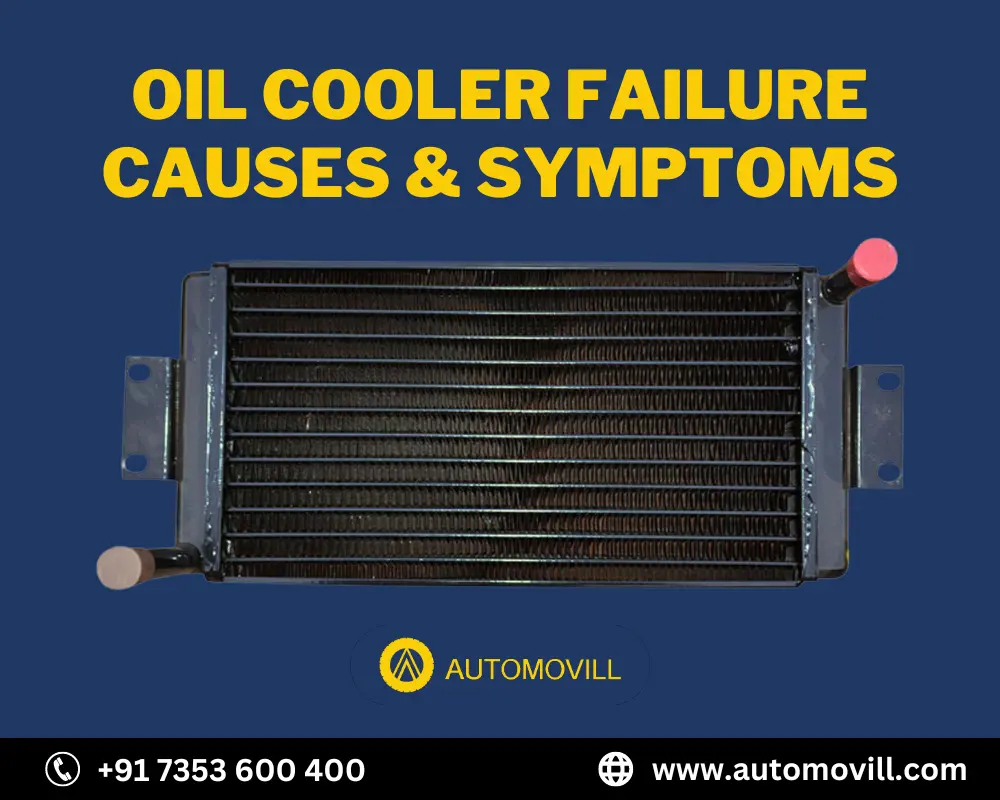
The oil cooler is an essential component of a vehicle’s engine cooling system that helps regulate the temperature of the engine oil. Over time, the oil cooler can become damaged, which can lead to a range of symptoms that affect the performance and longevity of the engine.
In this article, we will explore some of the common symptoms of a damaged oil cooler and explain why it is important to address these issues promptly.
Oil Cooler Failure Causes
There are several causes behind an oil cooler failure, including:
- CORROSION: Over time, the oil cooler can corrode due to exposure to moisture and other corrosive elements. This can cause the cooler to become weakened and eventually develop leaks.
- PHYSICAL DAMAGE: The oil cooler is typically located in a vulnerable area of the engine, and it can be easily damaged by road debris, rocks, or other objects. Even a small dent or puncture can cause the oil cooler to leak oil.
- CLOGGED or BLOCKED PASSAGE: The oil cooler has small passages through which oil flows, and these passages can become clogged or blocked over time. This can restrict the flow of oil, causing the oil cooler to overheat and become damaged.
- POOR MAINTENANCE: Like any other component of a vehicle, the oil cooler requires regular maintenance to ensure it stays in good working condition. If the oil cooler is not maintained properly, it can become damaged and fail prematurely.
- FAULTY INSTALLATION: If the oil cooler is not installed correctly, it can become damaged due to vibrations or other issues. This is why it is important to have the oil cooler installed by a professional mechanic who is familiar with your vehicle’s make and model.
In some cases, the oil cooler can become damaged due to a combination of these factors. For example, poor maintenance can lead to corrosion, which can cause the oil cooler to develop leaks over time.
Whatever the cause of the damage, it is important to have the oil cooler inspected by a professional mechanic as soon as possible to prevent further damage to the engine.
Oil Cooler Damaged Symptoms
1. Car Overheating
One of the primary functions of the oil cooler is to help regulate the temperature of the engine oil. If the oil cooler is damaged, it may not be able to do this effectively, causing the engine to overheat.
This can lead to a range of problems, including decreased performance, increased wear and tear on engine components, and in extreme cases, engine failure.
2. Engine Oil Leakage
Another common symptom of a damaged oil cooler is oil leaks. The oil cooler is typically located in a vulnerable area of the engine, and if it is damaged, it can cause oil to leak out.
This can be a serious problem, as low oil levels can cause engine damage or even failure. If you notice engine oil leaking from car, it is important to have it inspected by a professional mechanic as soon as possible.
3. Decreased Engine Performance
A damaged oil cooler can also lead to decreased engine performance. If the engine oil is not being cooled effectively, it can become thick and sluggish, which can reduce the performance of the engine. This can manifest as sluggish acceleration, decreased power, and reduced fuel efficiency.
4. Engine Warning Lights
Many modern vehicles are equipped with sensors that can detect problems with the engine oil and cooling system. If there is a problem with the oil cooler, it may trigger warning lights on the dashboard.
These lights can include the “Check Engine light“, the oil pressure warning light, or the engine temperature warning light. If you notice any warning lights on your dashboard, it is important to have your vehicle inspected by a professional mechanic.
5. Strange Noises
A damaged oil cooler can also cause strange noises to emanate from the engine. These noises can include knocking, ticking, or rattling sounds. These noises can be indicative of serious engine damage and should be addressed promptly by a professional mechanic.
6. Black Smoke
If you observe thick, black smoke coming out of the exhaust of your car, it is likely caused by oil leakage into the combustion chamber. You have to avoid driving your car in this condition, as it can result in permanent damage to the engine.
Conclusion
The oil cooler is an essential component of a vehicle’s engine cooling system. If it becomes damaged, it can lead to a range of symptoms that affect the performance and longevity of the engine.
If you notice any of the above symptoms, you must take your car to a mechanic to repair the oil cooler.
By addressing these issues promptly, you can help ensure that your vehicle stays running smoothly and avoid costly repairs down the line.
